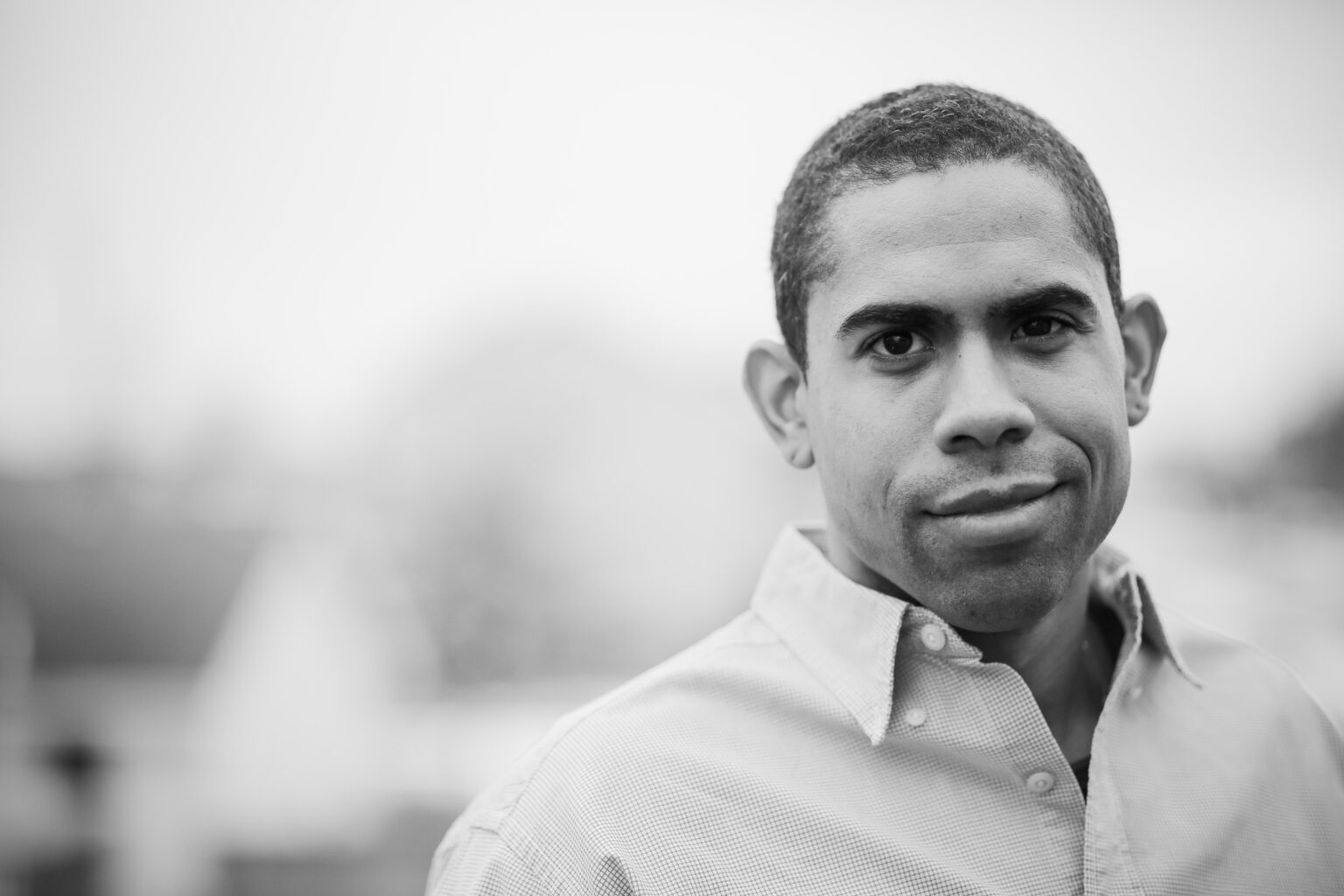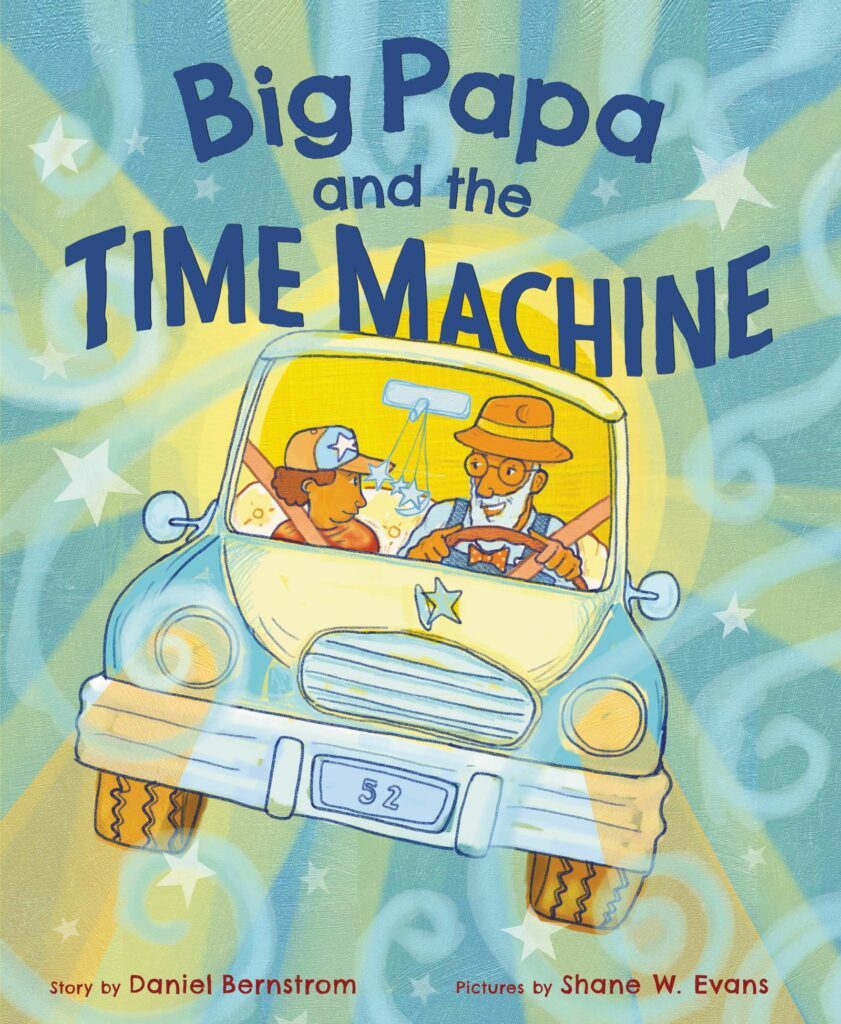Daniel Bernstrom, author of Big Papa and the Time Machine
Children’s Literature category, sponsored by Books for Africa
Each week leading up to the 33rd annual Minnesota Book Awards announcement, we’re featuring exclusive interviews with our 36 finalists. You can also watch the authors in conversation with their fellow category finalists here.
In a year defined by a pandemic and its fallout, virtually everything about our lives has changed in some way. How has COVID-19 impacted your writing habits and preferences? Has the unique zeitgeist of the past year influenced your writing output in any ways that you can pinpoint?

COVID-19 did not change much of my writing habits. I typically get up to write at about 4:00 – 4:30 in the morning. The house is quiet. My brain is still dreamy. The kids usually don’t try to get up at that time–I have five children. All that to say, I write every day. Though most of my writing is unusable, for me, writing is like walking or eating. It’s just something I have to do. The most challenging thing about the pandemic was that my children were home while I was trying to teach for my community college. My stress level went way up, but I was thankful for my writing habit that helped sustain me during that/this time.
Would you tell us one or two things about your finalist book that you are particularly proud of, and why? (Sure, it may feel a bit un-Minnesotan to say so, but it’s not boasting if we ask!)
I am proud to be an English teacher giving the gift of standard communication to my students, but I am also a lover of language. I wrote Big Papa and the Time Machine as a series of small stories. My Papa (my grandfather) told me these stories. As a mixed-race writer, with a foot in both of the Black and White cultures, I chose to preserve my Papa’s stories in a book written in Black English in an attempt to take a kind of spiritual/mental/emotional photograph of the way he was. When I read Big Papa and the Time Machine, I often have to hold back tears. It’s my grandfather speaking. It’s his stories. Every time I read it, I am reminded of him and how much I miss him.
What do you hope that your audience learns or takes away from your book?

Big Papa and the Time Machine is a narrative poem, and so I return to that idea of poetry being the spiritual camera that writers use to capture the things we cannot see: love, bravery, loss, fear, hope, spiritual darkness, spiritual light. I am a visually impaired writer, so I guess I’m getting used to seeing the world with different eyes. The mystics of old called these the spiritual senses. For example, when one reads a poem and there is that rising within (think of Maya Angelou or Emily Dickinson or even Amanda Gorman’s stunning performance at the Biden inauguration). When one reads a poem and then goes out for the day, when they encounter others, the poem, like a lens falling over the reader’s eyes, reveals to the reader the harmony or disharmony, the darkness and light, the manner, the form of those they come in contact with. Think of those cameras that can detect heat coming off your body, or think of an ultrasound or X-ray that sees through substance. That’s how poetry works. It reveals the sounds, the temperatures, the smells, the sights, the movements, and the feelings of the soul. When readers open Big Papa and the Time Machine, I hope that when they look at a struggling child, they now see so much more than just an obstinate child—I hope they are given a lens to see into the soul. I forget which child psychology book I read where it explained that when a child misbehaves, it is a cry… a scream to be loved more often than not. Sorry if that was confusing. My mother says I’m confusing.
Minnesota enjoys a reputation as a place that values literature and reading. If this sentiment rings true for you, what about our home state makes it such a welcoming and conductive place for writers?
I’m a native Iowan. I came to Minnesota for college. I didn’t come as a writer, though I loved writing. After graduation, when my eyes began failing me, it was Minnesota who helped rehabilitate me. They helped me adjust to my blindness. In that adjustment to blindness training through Minnesota State Services for the Blind and the Department of Employment and Economic Development (DEED), they provided me with the computer and training to begin my life again. I wrote this book on the computer provided to me by the State of Minnesota. I am a writer because of Minnesota. I am a community college English Instructor because of Minnesota. And when I applied to graduate school, it was a Minnesota institution, Hamline University, that took a chance on a visually-impaired writer. I had applied to 11 programs across the nation, including the University of Minnesota, but only Hamline University accepted my application. I longed for a Master’s of Fine Arts in Writing because I wanted to teach. Publishing was at the bottom of the list. Remember, I was losing my sight. My Bachelor’s degree was in Electronic Media Communication: sound and video editing. The strain on my failing eyes was too much, and it often caused me to get horrible migraines, dizzy spells, and brought on vomiting. The dizziness would last for days. I couldn’t sustain that kind of life, and my ability to perform basic editing tasks was also failing. I needed a job. Teaching was my hope. Hamline University took me in. Hamline exposed me to the University of Minnesota’s awe-inspiring Kerlan Collection (a library of children’s literature). Minnesota writer (and Hamline Faculty) Phyllis Root encouraged me to “think about publishing.” And Hamline introduced me to the Loft Literary Center, where Big Papa and the Time Machine won the Loft Literary Center’s Shabo Award. Through the Loft, I was able to work with Minnesota Writer and Caldecott Award Winner Susan Marie Swanson on this book. And it was this book, Big Papa and the Time Machine, that first got the notice of a Harper Collins editor–even though it took about eight years to eventually publish it. I know that was a long answer, but I tell this story to illustrate what Minnesota has meant to me. Minnesota changed my life. I am an accidental writer who was encouraged by Minnesota’s incredible goodwill, patronage of the arts, writing culture, and world-class institutions. There is no place I would rather be than Minnesota.
What advice would you give to an aspiring writer with an interest in your category?
I was just talking with a writing mentor of mine about this Minnesota Book Award. We talked about a hero of mine, David LaRochelle, and his writing approach, for I wish my writing were half as fun as David LaRochelle’s. So that’s the first bit of advice. Have fun with writing. For heaven’s sake, David LaRochelle wrote a book with two words. Moo and Baa. And he won the Minnesota Book Award for it! What a stupid but brilliant idea. No, it was a fun idea. So, have fun.
Next, I would encourage writers to find a community. Find people who like what you do. Sure, attend Hamline University’s MFA in Writing for Children and Young Adults. That would be beneficial. Go to the Loft Literary Center and take classes. Or take a Children’s Literature class at any one of the Minnesota State Colleges and Universities. I teach a Children’s Lit class. I know of another Black Minnesota writer who teaches a Children’s lit class, but many of the Minnesota State community colleges and universities teach a Children’s Literature class. Even better, it could be virtually free for senior citizens (60 years or older) but don’t quote me. Just look into it. Do that; it would be life-giving and informative. Even better, join SCBWI Minnesota. That would be essential. Oh, and then read a ton!
So, in short.
- Have fun.
- Find a community of writers.
- Take classes.
- Read.
Tell us something about yourself that is not widely known! (It doesn’t have to be about your writing.)
I think I’ve talked too much already, so I’ll keep this short and sweet. I lost my wedding ring within the first two weeks of marriage at a beach in Roseville, Minnesota. I don’t think I even told my mother that one. Sorry, Mom.
Daniel Bernstrom is the author of One Day in the Eucalyptus, Eucalyptus Tree, and Gator, Gator, Gator! He has a Master of Fine Arts in Writing for Children and Young Adults from Hamline University. He lives in Red Wing.

